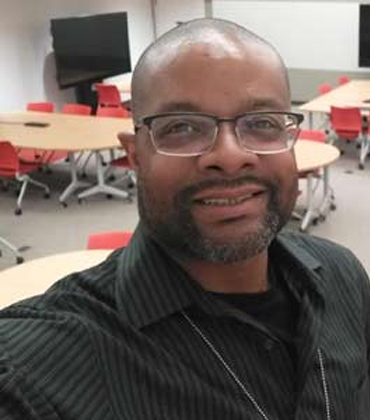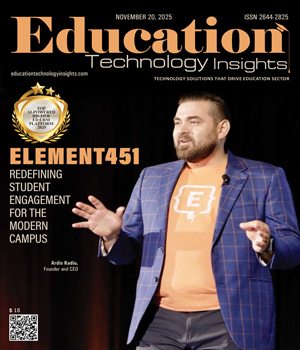THANK YOU FOR SUBSCRIBING
Be first to read the latest tech news, Industry Leader's Insights, and CIO interviews of medium and large enterprises exclusively from Education Technology Insights
On a Monday morning, a student submits her application to the college she’s long dreamed of attending. The portal confirms receipt. She anxiously checks her emails all week, hoping for a reply. Meanwhile, the rest of her world runs as usual, on instant feedback. Her pizza order tracks itself mile by mile. Her bank flags a purchase the moment it’s deemed suspicious. Her streaming app suggests a playlist based on her mood. But the college? Still silent. Across higher education, that delay is quite heartbreaking. Institutions celebrated for intellectual excellence often fall behind in delivering the same digital fluency that defines their students’ daily lives. The student who gets real-time updates from Amazon waits weeks to hear the first word about her academic future. “Today’s students compare universities not just to each other but to every seamless interaction they’ve had that day,” says Ardis Kadiu, founder and CEO of Element451. Element451 was designed to close that gap, bringing the digital experiences students expect into the heart of higher education. Its AI-powered CRM uses Bolt Agents—autonomous AI agents that function as digital teammates—to anticipate questions, route tasks and flag risks across admissions, marketing and student engagement. These agentic AI systems handle the repetitive work that bog down human teams, freeing staff to focus on meaningful interactions while each student’s experience becomes more responsive, personalized and infinitely scalable. With Element451, the same systems that once delayed responses begin to work in real time. Applications no longer disappear into inboxes. They trigger personalized workflows that guide each student from inquiry to enrollment with consistency and care. Admissions teams gain scale without burnout as automated Bolt Agents handle routine questions, schedule follow-ups and surface applicants who need attention.
Top Classroom Management App 2025
Every student deserves to be seen. When teachers have the right tools to engage students positively, the classroom becomes a place where everyone feels valued. Quite often, students go unnoticed not because teachers lack care, but because they are overwhelmed by many responsibilities. This makes them reactive toward struggling kids and coupled with the lack of real-time insight, small challenges grow into bigger issues. ClasStars changes this dynamic by helping teachers capture hundreds of automatically time-stamped data points and visualize engagement patterns. Instead of reacting to isolated incidents, they can proactively identify behavior trends and recognize each student’s progress. The impact is visible. Teachers no longer struggle to connect with students in the classroom. One user reported that students competed for the chance to clean the room, a striking reversal born from the culture of positive engagement that ClasStars fosters. The result is stronger relationships, proactive interventions and inclusive communities. “We call it measuring invisible progress—because ClasStars reveals the growth teachers could always feel, but could never see,” says Moshe Fried, co-founder and CEO. In another example, ClasStars helped a teacher transform her classroom culture through balanced feedback. Drawing on research from the Gottman Institute’s five-to-one ratio, the platform uses color-coded borders to visualize positive and corrective interactions. Within four weeks, her class shifted from a neutral one-to-one ratio to a majority of positive engagement, showing how data awareness can turn encouragement into the classroom norm.
Top K–5 Reading Intervention Solutions 2025
When leadership vision, teacher empowerment, and student outcomes align, literacy solutions go beyond short-term results to create lasting impact. Driven by this belief, Voyager Sopris Learning, an educational solutions company, delivers science-based programs in reading, writing, and math for K-12 grades. Its evidence-based solutions help learners master the foundational skills required for long-term learning and academic growth. From supplemental needs to intensive intervention, its comprehensive suite of solutions provides districts and schools the flexibility to meet every learner’s needs. The portfolio includes Voyager Passport® for K–5 reading, LINKS to Literacy™ for K–5 short-term reading support, and LANGUAGE! Live® for grades 5–12 literacy. Deeply rooted in academic research, these solutions strengthen instruction, close skill gaps, and accelerate student growth. “Our goal isn’t to offer just a program, but to build lasting partnerships that drive real, sustainable literacy success,” says Cassondra Mantovani, Vice-President of Revenue and Operations. Voyager Sopris Learning continuously innovates its product offerings to meet the evolving needs of educators and communities. LINKS to Literacy, launched in the summer of 2024, is designed to strengthen foundational reading skills through short-term, adaptable models, making it ideal for summer school, after-school programs, and tutoring environments. Teacher empowerment is a crucial aspect of a well-structured educational framework, and Voyager Sopris Learning understands this better than anybody else. It provides educators with explicit and systematic guidance that is ready to implement and easy to manage. Designed to focus on learner growth, it emphasizes research-proven instruction over time-consuming planning. The solutions also offer opportunities to tailor instruction for each student, ensuring effective and lasting impact. Across various academic settings, Voyager Sopris Learning’s programs have consistently demonstrated a real-world impact by making learning more accessible and effective. In the case of Kelly Elementary School in Pennsylvania, a third- grade teacher sought a structured yet flexible intervention that fit within her district’s multi-tiered system of supports (MTSS) model and aligned with the science of reading requirements. She implemented Voyager Passport for 30 minutes a day in small-group instruction. Within a few months, many students advanced almost a full grade level in fluency and comprehension, showing remarkable improvement.
Top Interactive Learning Solutions 2025
Students engage deeply when education is rooted in application-based understanding, rather than merely reciting concepts. When learners experiment, analyze and apply what they learn, comprehension becomes easier and knowledge transforms into skills. ActiveLearningLabs leverages this principle and transforms traditional education into interactive, real-world digital simulations and collaborative activities to drive active learning. Catering to educators, schools and districts, the ed-tech company offers modules that enhance teaching, enrich classrooms and utilize the ‘power of doing’ to engage students. Its hands-on, team-based experiences facilitate a deeper understanding of the lessons by making learning more immersive and result-driven. “Every activity is designed through the student’s lens, prioritizing what drives genuine engagement and builds durable skills,” says Tim Felke, founder and CEO. Each lesson is designed to be highly interactive, offering users opportunities to experiment and explore within dynamic digital models. This enables them to manipulate variables, observe cause-and-effect relationships and make informed decisions. The activities encourage teamwork through collaborative problem-solving grounded in real-world applications. From running a factory, starting a business or managing a project, the modules transform learning into practical, future-ready skills. ActiveLearningLabs’ approach is best demonstrated in one of their activities, where a group of students manages a snack stand at a virtual school field day event. Students work in teams using historical data to build demand models, adjust pricing and plan inventory in order to maximize profit. The activity teaches students to think critically, make data-driven decisions and reflect on outcomes achieved. This group-oriented collaboration culminates in classroom-wide competition that turns education into an inspiring and curiosity-driven experience. Educators are the catalysts of academic success, and ActiveLearningLabs ensures they are always equipped with the necessary resources. Through an intuitive teacher console, it provides a comprehensive set of tools that allows them to assign activities and track progress. The built-in guides and insights enable timely interventions, helping identify where additional support is needed and provide directions on how to address it. This minimizes administrative burdens, allowing teachers to focus on meaningful instruction.
CXO INSIGHTS

XR Technologies: Teaching and Learning through Interactive, Accessible and Immersive Experiences
Anthony Chow, PhD, Full Professor and Director, School of Information, San José State University

Elevating Learning Environments
Jarrod McFarlane, Director, Classroom Technology & Support Solutions, Stony Brook University

Flipping the Script: Revitalizing Writing Instruction with Hybrid Models and AI
Tony Sovak, Ph.D., Director LMS & eLearning Quality, Pima Community College

Ensuring Accessibility in eLearning: Navigating WCAG 2.1 and Beyond
Kim Buechel, Director of eLearning & Technology Solutions, Fox Valley Technical College

Delivering Exemplary Customer Service in K-12 Technology: Auditing the Experience for Teachers, Stud
Charles Franklin, Assistant Superintendent of Technology services and Information services, Cypress-
IN FOCUS
Interactive Learning Platforms Reshaping Global Education Systems
The evolution of education infrastructure shifts from physical assets to a digital, interoperable ecosystem, emphasizing personalized, immersive learning experiences and continuous data-driven feedback.
Classroom Management Apps Reshaping Global Education
Classroom management apps are evolving into essential tools in education, driving a multi-billion-dollar market as they enhance learning processes and foster personalized, connected environments.
EDITORIAL
Advancing Education through Innovation and Intelligent Solutions
As learning environments continue to transform, the education sector is embracing a wave of digital innovation that is reshaping how institutions engage, instruct, and support students. Today’s leaders face the challenge of balancing rapid technological adoption with the foundational mission of delivering meaningful, equitable learning experiences. The result is a dynamic ecosystem where creativity, strategy and data-driven insight converge. Across classrooms nationwide, emerging tools are redefining instructional models. Interactive learning platforms are fostering deeper engagement, allowing instructors to blend collaboration, multimedia and real-time assessment into a more immersive learning journey. In earlier grades, targeted reading intervention technologies are helping educators support foundational literacy with precision, ensuring students receive personalized guidance when it matters most. Meanwhile, classroom management applications continue to streamline daily routines, empowering teachers to focus more of their energy on instruction and student connection. Higher education institutions, too, are seeing transformative gains. AI-driven platforms are becoming indispensable as schools seek to strengthen recruitment, retention and long-term student success. Element451, recognized as a Top AI-Powered Higher Ed CRM Platform for 2025, exemplifies how intelligent automation and predictive analytics can elevate the student experience while easing institutional workloads. In this edition, we spotlight the innovators and solutions shaping a more agile and impactful education landscape. We also present insights from leaders such as Tony Sovak, Ph.D., Director of LMS and eLearning Quality at Pima Community College, and Kim Buechel, Director of eLearning and Technology Solutions at Fox Valley Technical College, who share their perspectives on today’s best practices and tomorrow’s priorities. Their expertise offers a clear reminder that technology’s true value emerges when paired with thoughtful strategy and a deep understanding of learners’ needs.
I agree We use cookies on this website to enhance your user experience. By clicking any link on this page you are giving your consent for us to set cookies. More info

However, if you would like to share the information in this article, you may use the link below:
www.educationtechnologyinsightsapac.com/edition/november-2025-22.html











